By Marilyn Tinnin
When Skin Color Didn’t Matter—
The Callaway Chargers Football Champs of 1975
With the opening of the Mississippi Civil Rights Museum in December, so many stories of racial injustice have been enshrined for posterity. Here is another true story that also deserves to be remembered, and it shines a positive and bright light on what can happen when people unite around a shared goal and commit themselves to excellence. It is a reminder of the truth of Philippians 2:4, “Let each of you look not only to his own interests, but also to the interests of others.”
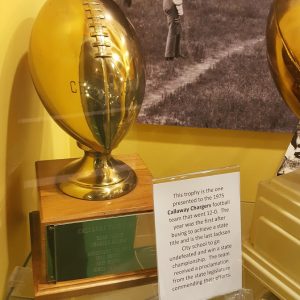
The Golden Championship Trophy
resides at The MS Sports Hall of Fame museum and details the story of the 1975 Callaway Chargers.
At Callaway High School in 1975, a diverse group of aspiring athletes bonded on the gridiron to lead their team to the first statewide championship of an integrated football team in Mississippi. No JPS team can boast such an accomplishment to this day. Over forty years later, that band of brothers—black and white—continues deep friendships with each other. Skin color has never been an issue for them.
In 1970, the U.S. Department of Education and the Department of Justice declared segregated schools unconstitutional and a massive busing plan was implemented across Mississippi. The effort did achieve a more racially integrated classroom at first, but the results did not create a more color-blind environment on either side in most places. Somehow, Callaway was different.
There seemed to be an unusual mix of administrators, teachers, coaches, parents, and students whose character and values fostered an environment of respect and cooperation. Nowhere was that fact more visible than among the members of the football team.
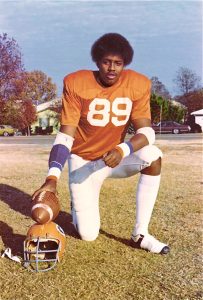
Tyrone as a junior defensive lineman.
Tyrone Keys (All American MSU, 1985 Super Bowl Champion, and Chicago Bear) was a seventh grader at Brinkley Junior High School in 1970. He says it felt like “a dark day” when he climbed on a bus mid-year to ride across town to a new campus. He had no idea what to expect, but quickly realized the “dark day” was a blessing in disguise.
Even then, Tyrone’s dream was to play in the NFL; therefore, he was quick to notice the older guys who were playing Varsity when he was playing at the junior high (middle school) level. The racial harmony was evident there, too. Tyrone believes that in that particular time, it was a positive thing for seventh and eighth graders to be in school with the eleventh and twelfth graders because they were wholesome examples for the younger ones.
Coach Odell Jenkins, who was the only African American coach on the staff in 1975, became a lifelong mentor to the entire team. He lauds the innate talent that earned college scholarships for eight of the eleven starters, and at least five went on to play in the NFL, but he adds, “They were not just good football players—they were good people, and they went on to do good things with their lives.” There were physicians, attorneys, law enforcement officials, and successful businessmen among that team.
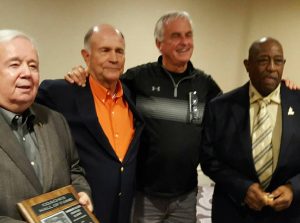
Coaches Bill Lea, Skip Bilbro, Hill Denson, and Odell Jenkins.
A man of great humility, Coach Jenkins does not brag, but many of his past players credit a lot of their success in life to Jenkins. As Bobby Bell, one of Tyrone’s teammates and one who made law enforcement his career said, “Coach Jenkins was my mentor before I ever knew what a mentor was.”
Jenkins took his role as a coach seriously saying, “Coaching for me was not just what I did from 3:45 to 6:00 every day. You have to be involved in the kids’ lives. I always told them that if you’re going to play for me, you are going to mind. But I would always be there for them. I was firm but fair.” It appears that he is still there for them today.
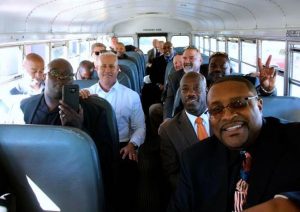
Forty years later, the 1975 Chargers travel by school bus to deliver their trophy to the MS Sports Hall of Fame museum.
When the team held a 40-year reunion in 2016, the members got together at the Callaway campus, rode an old JPS school bus together to the MS Sports Hall of Fame Museum, and presented their 1975 State Championship trophy to Bill Blackwell, Executive Director. Former coaches Charlie Allman, Skip Billbro, Hill Denson, and Bill Lea were all there beaming like proud fathers and celebrating the lifetime successes of an exceptional group of leaders they had helped shape. The event was well attended, and the video of that day reveals a very warm reunion of friends.
Lamar Nesbit was the assistant principal at Callaway in 1975. Now retired from JPS, he heaped praise on the entire culture of the school at the time. There was strong leadership in every area. He mentioned a viable PTA, a committed and competent faculty, and students who wanted to succeed. “Guys like Tyrone were also the glue that made things stable,” he said.
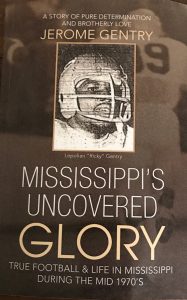 In 2008 Jerome Gentry, who was the Charger junior nose guard, wrote a book about the legendary team. Mississippi’s Uncovered Glory tells a beautiful story of the way friendships, mentors, and a strong support system came together.
In 2008 Jerome Gentry, who was the Charger junior nose guard, wrote a book about the legendary team. Mississippi’s Uncovered Glory tells a beautiful story of the way friendships, mentors, and a strong support system came together.
He wrote, “It was family, not just a football team. We were all friends and our coaches were father or big-brother figures.” He described Thursday night dinners together when the parents—black and white—hosted steak suppers for the team in their homes. Jerome says, “The black and white parents would accept us all as their kids. In the football environment, color did not seem to matter.”
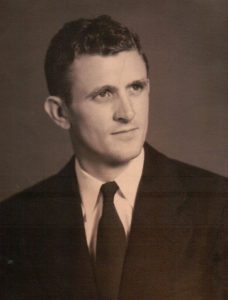
Mr. Jerome Smith was the principal who guided Callaway during the transition days of the late 60s and 70s. He set the tone and saw a unified student body.
I have always said that God can use anyone or anything for His purposes. In 1975, I believe he used the game of football to demonstrate to a group of high school kids that racial reconciliation is not just something you “ought” to strive for—it’s really something that can bring lifelong joy and friendships.
Tyrone, who heads his own 501(c)(3) called “All Sports Community Service,” providing nurture, education, and mentoring to at-risk youth, is always quick to credit much of his success to the mentors God put in his path all along his journey. His life since his NFL career has been committed to giving back to others in the same way.
During the Mississippi Sports Hall of Fame Museum presentation with his former Callaway teammates, he said, “This ball without education and without the proper mentoring is a disaster. I encourage the young people to develop character because football by itself is a non-transferable skill. But you can take everything you learn from the coaches and the teachers and you can parlay everything with what you learn on the football field into the game of life. And you can come back and help the next generation on this journey.”
(I highly recommend that check out this YouTube video and appreciate the 1975 Callaway Charger Football program at http://bit.ly/1975Chargers)
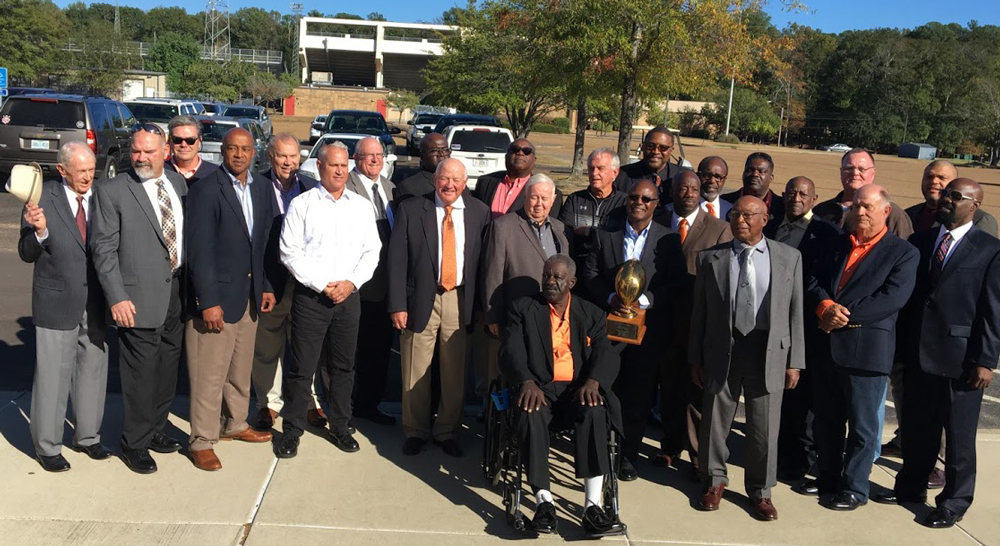
Alumni and coaches celebrate the 1975 Charger team 40 years later.